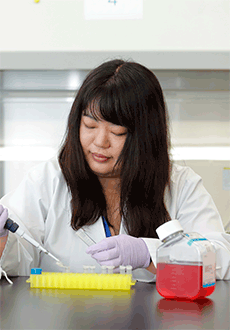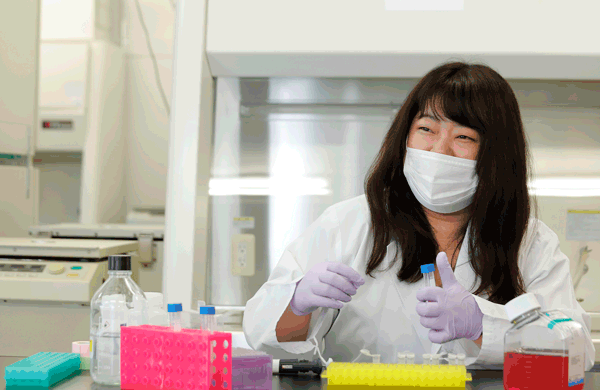Illness is just another form of diversity; I just want to support others, even if my contribution is modest (Yukiko Tanigawa, Technical Staff II)

Many women active in a variety of fields work at RIKEN BRC. We interviewed 12 of these women for their insights on how they continue to flourish with work styles that fit their particular lifestyles.
In this interview, we talked with Yukiko Tanigawa, a technical staff member in the Gene Engineering Division (RIKEN BRC Gene Bank).
She gave up on having a career in research once, but she made a resolution and achieved her dream. Later, she suffered from connective tissue disease after having a child, and she spoke about how this experience made her realize both the importance of research for patients and the potential of research. She spoke to us about her thoughts on work, motivation, and hopes for the future, among other topics.
Profile
- Yukiko Tanigawa
- Technical Staff II, Gene Engineering Division (RIKEN BRC Gene Bank)
- Tanigawa became involved in research in 2014 as a temporary employee, and in 2017, she took a position as a technical staff member. In 2018, she suffered an outbreak of connective tissue disease during her maternity leave before and after she had a child and her childcare leave, but returned to work in 2019. Currently, she is making use of a program that allows employees to work a reduced schedule and is in charge of operations for the deposit and distribution of bioresources such as plasmid as well as quality checks.
I dropped out of graduate school and just worked part-time jobs, but never gave up and worked to become a research scientist again.
In college, I majored in agricultural chemistry, and went on to the master’s degree program. However, when I was looking for a job, I got a rejection letter from a company I was really interested in and decided to give up on the research profession and quit graduate school.
After that, I worked part-time in a cafe for a year, but whenever I went to a bookstore, I always bought bioscience books, and every day I felt a pull back to research work. I realized I had nothing to lose, so I decided to register as a researcher with a staffing company. They introduced me to a job at RIKEN.
I had thought that a research lab is a very special environment. Before joining RIKEN, I had this image that there would be lots of taciturn geniuses and that everyone would be devoted to their work, but instead, I was struck that actually everyone was just very human. There are people who love to talk, and people who are balancing their work with childcare and caring for aging family members, for example.
Everyone on the team is really kind, and they eagerly shared their knowledge, approaches, and work processes with me, even though I was essentially an amateur. This allowed me to get used to the workplace very easily.
I suffered from a connective tissue disease after I had a child, but I came back to work to help people in the same situation.
When I had my first child, I suffered from a designated connective tissue disease. My first episode was in 2018. When I was notified of the diagnosis, I was really depressed to learn that there is no treatment method, so at first, I just wallowed in sadness every day.
But I also realized that since my disease’s onset, new medicines that ease the symptoms have been approved for domestic use and immunological research has moved ahead at an impressive speed. In addition, I really felt deeply that this research is a source of major hope for patients who need the power of bioscience.
The gene stock that we work with is extremely effective in accurately and rapidly moving bioscience research forward. There have been times when I worried about whether I could continue with work, but the thought that my work may play a role in helping someone who is suffering in the same way, both physically and mentally, has motivated me, and I’ve decided to continue.
My coworkers are very understanding of my illness, and let me work one day a week from home in light of my doctor visits and physical condition. I am really grateful that they have been so flexible regarding my work style. I hope to continue working on this research while dealing with my illness to help people in the same situation as me.
Diverse employees are essential for the future of the research profession. The skills of women and young people will be valued in this age.
I often hear about the “diversity of human resources” these days, and I think that bringing in diverse employees will be increasingly important in a wide range of professions related to research, too.
For example, there is an image that most research scientists are men, but RIKEN clearly states that “when hiring new employees, we proactively hire women when skills are deemed equivalent based on a fair screening.” Women, who do a large percentage of the housework, tend to have good multitasking skills at home, like cleaning while doing laundry. This kind of skill leads to speed and accuracy when conducting experiments.
Many young people have strong Internet literacy and are really good at applying their own skills in an appealing way on the Internet, with professional-level writing and illustrations. In the research profession at present, there is a push for “open science,” in which research results can be accessed online from anywhere in the world. This kind of work requires the strengths of the next generation, which is so good at working with computers and the Internet.
There is demand in a wide range of fields other than the research profession, so I would be really pleased if people with all kinds of different skills consider work related to research as one of their options.
